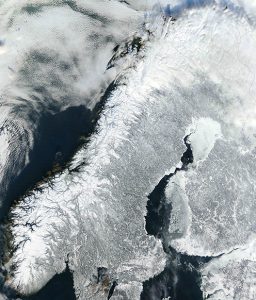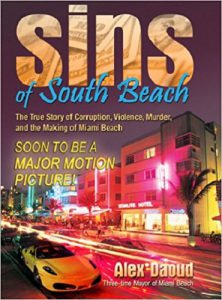Dr. Mathieu Basille is an assistant professor in the WEC department. Originally from France, his work studying landscape ecology has taken him from there to Norway, Quebec, and now to the IFAS/Ft. Lauderdale Research and Education Center in south Florida.
Work
When did you know you wanted to work in ecology? Is there an origin story from when you were a kid or a teenager and decided this was what you wanted to do?
When I was a kid, my goal in life was to study big cats in Africa. The irony is that I actually did my PhD on lynx in Norway, which is SO CLOSE in a way, but at the same time, quite the opposite of what I had in mind.

Still, (Africa) was a defining feature of my goal when I was a kid, and the rest of it I would say is mostly seizing opportunities when they show up, which is why I ended up in Norway. Then I spent three years in Quebec before moving to Florida. So I guess I moved further away from my dream of Africa, but I’m still doing what I love, which is studying wildlife.
What’s one word that describes how you work?
Open-mindedness.
What’s your favorite organism you’ve studied and why?

Raccoons, just because I’m starting a project with raccoons and I haven’t studied them yet, but they’re the coolest organism you can imagine in south Florida. First of all, they are super adaptable. They exist almost everywhere in North America, especially where there are people, and they are experts at making the most out of any environment. For instance, down here you can find them in the middle of the Everglades, but you can also find them in our IFAS/Ft. Lauderdale Research and Education Center parking lot, or any place else, especially where there is trash. So they make the most out of any environment. At the same time, if you take a raccoon from the middle of the Everglades or a raccoon from the middle of a parking lot down here, they’re scientifically the same species, the same animal.
So that’s one thing that makes them super cool, but given that they’re making the most out of any environment, they also have a HUGE impact on any environment. For instance, they are omnivores, they eat pretty much anything, to the point that trash is good for them. But they’re also able to prey upon a whole range of different animals, including birds. They go in the nest and get the eggs, and it’s been documented that they’re able to go after alligator and crocodile eggs as well, even though they wouldn’t get a chance in front of an adult alligator or crocodile.

Another cool thing – well, “cool”, or maybe that’s my nerdy perspective on that – from an ecological perspective, raccoons probably carry the most ”opportunists” on them than any other animal you find in Florida. They have parasites, pathogens, and contaminants even. There was a study that showed they can carry altogether 130 different parasite species, contaminants and so forth. There’s a lot to study on raccoons or in them, and some of these things are potentially a hazard for people, as well. It’s famously known that raccoons carry rabies, and even if it’s rare, it’s still potentially an issue. They also carry other diseases, like salmonellosis, brucellosis, and toxoplasmosis. You name it, they have it.
That makes them a super cool animal from my perspective, given how closely they exist with people, the potential pathogens and toxins, and the potential hazards for people.
What’s an unexpected experience you’ve had because of your work?
The one I’d like to mention actually happened only by chance. I was contacted by a seabird ecologist, about two years ago, to be part of a large project studying seabirds, in particular, the fact that they use infrasound to navigate the ocean. I’m definitely not known as a seabird person, I’ve never had any professional interest in seabirds, so the offer really came out of the blue. So now we have this huge international project, shared among four faculty from all over the world. We have the seabird ecologist who is organizing this from Liverpool in the UK, we have a geophysicist from the Netherlands, we have a physiologist from South Africa, and we have an ecologist (me) in Florida. We built this big team to work towards asking the question about the use of infrasound in seabird navigation.
No one has really considered the question before, and I would say it is a true, basic question in ecological terms, to advance the state of knowledge of seabird navigation. How do they do it? If you think about it, when the birds are on the open ocean, all they can see is just the ocean and they have no clue, at least from a human perspective, of where to go and how to get there.

So now I’m going to get the chance to travel to the UK, to South Africa, to the Netherlands, all thanks to this big project, and all this just happened by chance.
I was contacted because I have an expertise that was a fit for what was needed. Essentially they needed a movement ecology expert, and now I’m on board for this awesome project, something I’d never have expected if you’d asked me just three years ago.
What is infrasound?
Infrasound is a sound that we humans don’t hear because the sound wave is at a lower frequency than our ears can hear. But many animals can hear these lower frequency sounds, and these sound waves are pretty much everywhere on Earth. The ground produces infrasound, every geological movement produces infrasound. Some animals actually produce infrasound: whales communicate partly by using infrasound that they generate. When the sound gets so low, not in terms of volume but in terms of pitch, that we can’t hear it, that’s infrasound.
It’s still the physical structure of a sound, except that humans are not able to detect it.
Lifestyle
How do you manage your time?
Poorly. Everybody would agree on that, I guess. I work mostly in terms of projects – let’s say I have competing projects, so I work in bursts of time dedicated to a specific project, and I’ll work long enough to advance the project as much as I can. You have to because you have deadlines.
Then I’ll switch to another project and I’ll go head on with this next project until I get done, so on and so on. It means I’ll get a lot done on a given project, but there are always other projects, waiting for my attention and time.
How do you balance long periods in the field with your personal life?
I don’t really have extensive fieldwork with my projects. Even the new raccoon project is going to consist of very intensive but short trips into the field. There’ll just be a dedicated field week every three months.
As for a good balance between my work in general and my personal life, that’s a whole other issue. I try to keep it sane by dancing a lot and seeing friends!
Have you got a great wildlife joke or humor to share?

My native language is French, so I don’t have jokes that translate well, but I will mention that there’s this great Norwegian movie called Troll Hunter (it has an original title, but that’s the translation). I will say that it’s not quite clear to me how humorous a movie they intended to make, but it turns out funny, and I think every field biologist should watch it.
These are people looking for trolls in Norway. It’s a very dry humor type of thing.
As field biologists you get a different reading of the same movie.
What are you currently reading?

I’m trying to finish one book that’s been on my night table for a while, which is called “Sins of South Beach” by Alex Daoud. It’s the story of Alex Daoud himself, who is a former Miami Beach mayor. Are you really familiar with Florida? Did you grow up in Florida?
Yeah, I grew up an hour and a half north of Gainesville.
So you are probably familiar with the Miami Vice era, when Miami was all about drugs and crime and everything like that. Daoud was the Miami Beach mayor back then, at the worst time in the history of Miami Beach, and he was trying to make it a little better for the people who were living there. It’s an amazing story of corruption, sex, abuse of power, and such. I happened to know Alex Daoud personally because he was my former landlord in Miami Beach. If I didn’t know him, I would think this story was just plain fabrication, it just cannot happen, but yes it did happen, it happened about 35 years ago in South Beach.
The guy who wrote the book was your landlord!?
Yes. It is a bit crazy, he actually went to jail because of all the corruption that was part of Miami Beach politics at the time. After that, he just retired from politics and owned an apartment building. That’s how he became my landlord, or more accurately, I became his tenant.
On top of that, he happened to be a former amateur boxer, and he was actually the sparring partner of Muhammad Ali when Ali was training himself for the elites. The entire life of this character is interesting.
That’s a crazy personal arc.
Yes.
In Closing
Is there one piece of advice you would like to share with students who will read this interview?
Yes.
One very specific piece of advice is to take your time and pick the right adviser. Take time to talk to them, to get to know him or her, because you are going to spend the next few years working for them. You want to make sure that it works both ways: that you are the good fit for them; and they are the good fit for you. Students tend to forget about that. For instance, when there is an interview, it works both ways. It’s not only supervisor or faculty recruiting a student, but it is also the student recruiting him or her in a way.
Be very careful in how you decide, even if it’s your dream PhD position. If it’s not with the right person, it can really become a nightmare, so make sure you get the right person.
Who else would you like to see answer these questions?
I think I’d like Katie Sieving to answer these questions.
Perfect, I’m interviewing her next week!
Oh, excellent. Excellent!
Note: We actually wound up releasing Dr. Sieving’s interview first. Read it here!
Is there anything else you’d like to tell people?
Yes, come visit me down south!
I never got this joke the first time I heard it, but the distance from Miami to Gainesville seems a lot further than the distance from Gainesville to Miami, and it’s pretty true. So I would say come visit me!
Openness was my choice of word to define my work. It also holds true for visitors who want to come down here.
Plus, we’re a big door to the Everglades!

This interview is by Rhett Barker
It has been lightly edited by Rhett Barker and Claire Williams for clarity.
Thanks to Dr. Basille for sitting down with us.
To learn more about the work being done at the UF WEC department, click here. To learn more about the IFAS/Ft. Lauderdale Research and Education Center, click here!
The concept for this interview is based on an interview series by the University of Washington called How UW Works, which is in turn based on a series called How I Workby LifeHacker magazine.
 0
0
